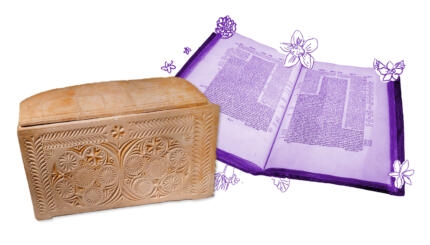Today we begin the penultimate tractate of Seder Moed, the large collection of tractates that have to do with festivals. We began this seder nearly two years ago, with Tractate Shabbat, and we will finish it in about two months when we come to the end of Tractate Chagigah.
The word moed means festival. Today’s new tractate, Moed Katan, means “little festival,” and it discusses the laws of intermediate festival days — the middle days of Passover and Sukkot — during which the work prohibition is relaxed. Today, these days are more commonly called hol hamoed, meaning the less sacred portion of the festival (hol literally means common or profane). This tractate also covers the laws of mourning and excommunication, and it will all fly by in just 29 pages.
Why are festival laws different on the intermediate days? The most straightforward answer is that the Torah tells us so. For instance, here is Leviticus on Sukkot:
Mark, on the 15th day of the seventh month, when you have gathered in the yield of your land, you shall observe the festival of the Lord seven days: a complete rest on the first day, and a complete rest on the eighth day. (Leviticus 23:39)
With your help, My Jewish Learning can provide endless opportunities for learning, connection and discovery.
It’s clear that the first and last days of Sukkot are meant to be the high points of the festival, days of complete rest. Likewise, here is what the Torah says about Passover:
You shall celebrate a sacred occasion on the first day, and a sacred occasion on the seventh day; no work at all shall be done on them; only what every person is to eat, that alone may be prepared for you. (Exodus 12:16)
Already in this verse from Exodus we see that there is a leniency on the work prohibition even for the most important first and final days of the festival: Work may be done to prepare food for the festive meal. This was the primary subject of Tractate Beitzah, which we explored just a few months ago.
The work prohibition relaxes even more on the intermediate days of the festival. But just how much? That’s what we will discuss in this tractate.
The opening mishnah, which describes specific kinds of labor that may be performed on hol hamoed, hints at larger principles and analogies that the rabbis use to determine the law. Here’s how it begins:
One may irrigate a field that requires irrigation on the intermediate days of a festival as well as during the sabbatical year, both from a newly emerged spring and from a spring that did not just emerge. However, one may not irrigate a field with rainwater or with water drawn with a shadoof.
This mishnah, which states that one may irrigate a field from a spring, but not from rainwater or well water, suggests that the rabbis permit irrigation during hol hamoed only if it is not overly onerous. Redirecting a spring and letting it do the work of watering your plants is one thing. Schlepping bucket after bucket of water across a field is quite another.
As we saw with Tractate Beitzah, the rabbis are looking for a balance between keeping society up and running, making sure that the festival does not place undue hardship on people, and preserving the special joy of the festival week. The balance lies somewhere between doing no agricultural labor at all, which in the case of a neglected field could precipitate financial ruin (no pun intended!), and toiling to such an extent that the festival goes unnoticed.
Further down the page, the Gemara articulates another principle derived from the mishnah: Labor should be performed on the intermediate days of a festival to prevent considerable loss, but not to increase profits. The festival shouldn’t make us poor, but it is not the time to ignore the season of our rejoicing to chase extra financial gain.
Intriguingly, the opening of this mishnah also suggests that there is a parallel between the intermediate days of a festival and shmita, the sabbatical year. During shmita, observed for a full year every seven years, land is not farmed and one is allowed to harvest only what grows spontaneously. We let the land rest and celebrate. Just as we should for the full week on both Passover and Sukkot — at least as much as possible.
Read all of Moed Katan 2 on Sefaria.
This piece originally appeared in a My Jewish Learning Daf Yomi email newsletter sent on January 14th, 2022. If you are interested in receiving the newsletter, sign up here.



